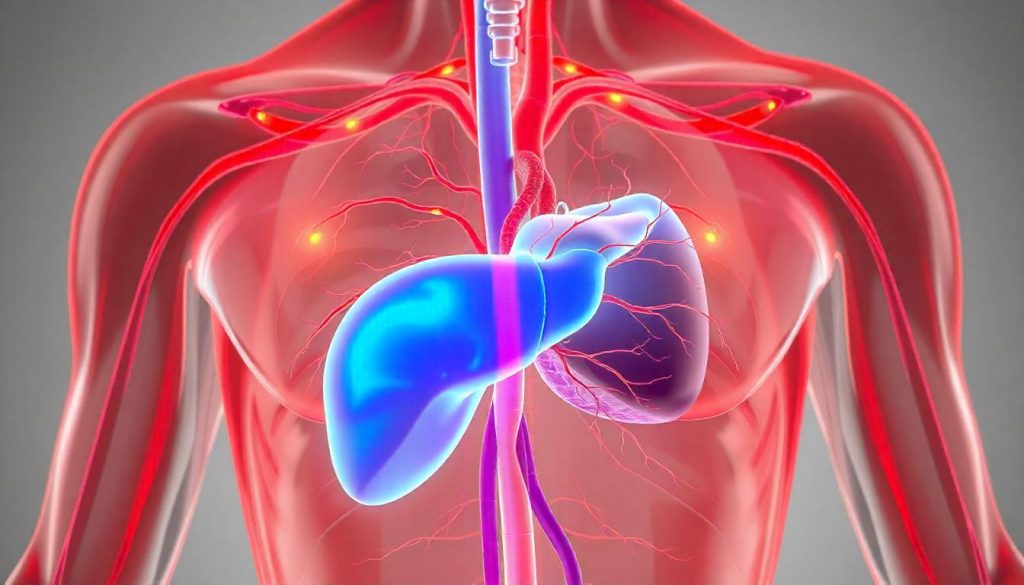Liver Failure
- Home
- Specialities
- Critical Care
- Liver Failure

Overview
Liver failure means that your liver is shutting down and failing to perform its essential functions. This can happen rapidly or gradually. Symptoms of liver failure can affect almost every major body system. When liver failure is final, it can be fatal without a liver transplant
What is acute liver failure?
Acute liver failure happens suddenly, when something overwhelms your liver’s capacity to cope. It’s usually a large toxic load, like poisoning. Sometimes, it’s a severe viral infection. In acute liver failure, your liver rapidly begins to shut down, causing immediate symptoms. This is a medical emergency.
What is chronic liver failure?
Chronic liver failure is the end stage of chronic liver disease. It happens when something has been damaging your liver for a long time, and the damage has finally become irreversible. Chronic liver failure follows cirrhosis, severe scarring of your liver tissues. Scar tissue prevents your liver from functioning.
What are the signs and symptoms of liver failure?
You may notice different signs and symptoms of liver failure based on how advanced it is and which complications have begun to occur. The first symptoms of chronic or acute liver failure may include:
- Abdominal pain (especially in the upper right).
- Fatigue and malaise (feeling unwell).
- Nausea, vomiting and loss of appetite.
Symptoms more specific to liver disease may appear after these. The first warning signs of a damaged liver that’s starting to fail are signs of bile and other toxins building up in your blood. These may include:
- Jaundice (yellow tint to the whites of your eyes and skin).
- Hepatic encephalopathy (altered mental status).
- Pruritus (itchy skin, but with no visible rash).
- Dark-colored pee (urine) and/or light-colored poop (stool).
Chronic liver failure may also show up in subtler ways, like:
- Easy bleeding and bruising (coagulopathy).
- Visible blood vessels that look like spiders or like a rash of tiny dots.
- Small, yellow bumps of fat deposits on your skin or eyelids.
- Digestive difficulties, especially with fats.
- Weight loss and muscle loss.
- Musty-smelling breath.
Other serious signs of liver failure include:
- Ascites (abdominal swelling with fluid).
- Edema (swelling with fluid in your ankles, feet, hands or face).
- Vomiting blood or vomit that looks like coffee grounds.
- Motor dysfunction (twitching, tremors or lapses in muscle control).
- Low urine output.
- Shortness of breath.
What are the complications or effects of liver failure?
Your liver performs many important functions, supporting many different body systems. When these begin to fail, you’ll notice the effects throughout your body. For example, you might notice:
- General toxicity, feeling ill, tired, foggy or confused.
- Toxins interfering with your brain, nerves and motor functions.
- Digestive difficulties, malabsorptionand malnutrition.
- Reduced blood clotting, easy bleeding and bruising.
- Reduced immunity and frequent infections.
In addition to these effects, many people with chronic liver failure already have complications from cirrhosis. Cirrhosis causes the side effect of portal hypertension, which in turn can cause:
- Fluid leakage, edema and ascites, a risk for peritonitis.
- Gastrointestinal varices and acute gastrointestinal bleeding.
- Enlarged and overactive spleen that removes too many blood cells.
- Low blood oxygen levels via hepatopulmonary syndrome.
- Chronic kidney failure via hepatorenal syndrome.
How do I take care of myself while living with liver failure?
Acute liver failure is an emergency. If you think you might have it, you need to go straight to the hospital. Chronic liver failure isn’t an emergency, but it’s equally serious. If you’ve been diagnosed with chronic liver failure, you can help support your liver by maintaining a healthy diet and lifestyle.
- Minimize substance use: Avoid alcohol and tobacco, take medications only as prescribed and try to avoid using over-the-counter pain medications. Consult your healthcare provider about any herbs or supplements you want to take.
- Eat a healthy, balanced diet: Excess sugar and fats in your blood are stressful to your liver. You might want to consult a nutritionist to help you design a long-term plan, especially if you have nutritional deficiencies as a side effect of liver failure.
- Protect your immunity: Liver failure weakens your immune system, and common viral and bacterial infections may add stress to your liver. Take care to protect yourself during flu season. Ask your provider about recommended vaccines.
Our Team
Doctor Name
Degree, Speciality
Doctor Name
Degree, Speciality
Are you having health problems? Contact us today!
Call Us 24/7: 0161-525 25 25

